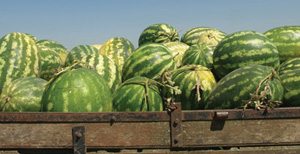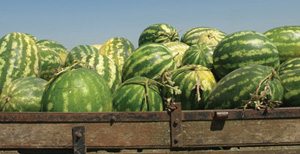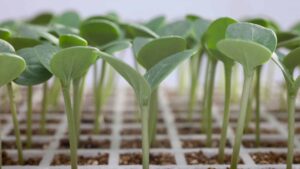A need for global harmonization.
Seed companies in today’s global environment need to be aware of many different types of seed trade regulations around the world. These regulations can be unclear, contradictory, ever-changing and downright frustrating to seed exporters, but with global harmonization, the process can be made easier.
Whether developing a local business presence in an overseas market or exporting seed around the world, most companies ship seed (including commercial, foundation or research seed) from one country to another at some time. Shipments must meet complex seed health standards and other requirements. The regulations can be even more intricate in the case of the re-export of seed, where product is produced in one country, shipped to another for processing or other value-addition, and finally ends up in yet another country.
The Background to Seed Trade
When selling seed in a foreign country, all local requirements governing seed trade must be met. This includes any product registration or seed certification requirements, local seed laws and intellectual property rights systems. In many cases, local laws (for example, laws regarding deregulation of biotech products, use of plant patents and tolerance levels for unapproved events) are vastly different than laws in the seller’s home country.
All of these issues are part of a country’s foreign and trade policy agenda, and government and industry groups are focused on harmonizing regulations across regions and ensuring these are science-based and reasonable, while still allowing seed to move around the world so the benefit of technology and improved varieties reaches the world population.
Seed health regulations for seed shipments have the most immediate impact on many seed companies. While it is appropriate to use phytosanitary regulations as a way to protect a local environment from the introduction of unwanted pests, the regulations should be based on scientific research, and should be clearly and consistently communicated. All too often regulations used at borders are either unknown to the shipper and/or are not science-based. They may be either politically motivated or based on assumptions or incorrect science.
Communicating the Regulations
The two primary forms used to communicate phytosanitary regulations to the importer and exporter, as well as border officials, are a government-to-government notification system or a phytosanitary certificate. Any special seed health issues are addressed in an additional declaration requirement on the certificate.
Governments determine the pest issues of concern for crop species from each country of origin. In the United States, for instance, seed health officials from around the world notify the Plant Protection and Quarantine program of the Animal and Plant Health Inspection Service, responsible for maintaining information on global import regulations (from the United States to the destination country) in the Export Certification Project (EXCERPT) database. Likewise, APHIS works to prevent the introduction of potential pests into the United States, and communicates its import requirements to foreign governments. Similar organizations and systems exist around the world.
An acceptable controlled pest restriction is one where all of the following conditions are met:
• The pest occurs in the area of production
• The pest is transmitted by or with seed as the pathway
• The pest does not exist in the destination country and would cause problems if introduced or, if present, is under some form of official control such as eradication or containment.
The available methods to determine absence of a pest in a seed shipment are: area freedom declarations, field inspection of mother plants, seed treatments, seed inspection prior to and/or post-entry, and sometimes post-entry field inspections.
To determine the presence or impact of a pest risk, a Pest Risk Analysis can be conducted. This is a time-consuming and expensive process, so several countries also proactively maintain a database of region, crop and pathogen combinations. In the United States, APHIS maintains the Global Pest and Disease Database at the Center for Plant Health Science and Technology, as well as the Cooperative Plant Health Survey, which focuses on distribution of domestic pests and pathogens. The National Seed Health System also maintains a database of all official testing methods and accredited testing agencies. On an international level, the science-based development and information organization CABI maintains several databases of plant/pathogen combinations which can impact agriculture and the environment.
There are also a number of regional and global treaties and organizations governing the establishment and regulation of agricultural trade rules, including those involving seed. These include the International Plant Protection Convention, the North American Plant Protection Organization, the European and Mediterranean Plant Protection Organization and the Agreement on Sanitary and Phytosanitary Measures of the World Trade Organization.
Harmonization and Consistency are Key
However, this scientific system is not always followed. There are numerous examples of new regulations suddenly being applied, of border control officials using different regulations than the importers or exporters use, of regulations that are not based on any scientific or factual data, and of requirements to use seed tests which do not correctly determine the presence of a pest or are incorrectly conducted. This is the everyday reality of importers and exporters, and is a constant threat to the free trade of seed around the world. As a result, this issue has become a major focus for all seed associations, including the American Seed Trade Association and European Seed Association.
A perfect example of a seed health issue with a unified global response calling for clear, science-based and harmonized rules happened recently in Brazil.
For many years, commercial seed shipments from around the world have been entering Brazil with field inspections ensuring that no pests have been introduced into the country. On December 30, 2010, Brazil published a new seed health rule named “Normative 36,” without any prior notice or comment period. Normative 36 requires:
• That all seed from all origins is treated
• That an additional declaration on the phytosanitary certificate states that the seed is free of all quarantine pests of concern to MAPA (the Brazilian plant health organization)
• That seed is tested in Brazil for these pests. Normative 36 also forbids the seed from being planted until test results are obtained.
Normative 36 contains annexes for each country listing all seed species to which it applies. All common seed species traded and all common production areas and countries of origin, such as the United States, Holland, France and Japan, are impacted by this rule. Of major concern to companies exporting seed to Brazil is that Brazil no longer accepts field inspections, but import requirements are based on seed testing. There is no information provided on which of Brazil’s quarantine pests are associated with each seed species.
Without knowing which pests are of concern in which species, and without knowing the seed testing methods for these pests, the international seed community cannot possibly comply with this new rule. Additionally, because MAPA intends to retest all incoming seed shipments, there is a high likelihood of test result discrepancies. This lack of clarity is of grave concern as such a highly restrictive, across-the-board requirement for commercial seed will severely disrupt or stop all seed exports to Brazil.
Working on a Solution
Once it became aware of Brazil’s new seed regulations, APHIS immediately began working on solutions with ASTA and ESA, as well as the Seed Association of the Americas and the International Seed Federation. Importantly, the Brazilian Seed Trade Association (ABRASEM) was contacted, and after several global seed association telephone conferences to coordinate efforts, ABRASEM arranged a meeting with MAPA to attempt to repeal the new rule.
MAPA then revised Normative 36 to allow field inspections instead of seed testing until March 2012, which is a temporary reprieve only. MAPA also indicated they will publish pest lists for each seed species on the annex. In February, a list was published for carrot seed. However, while it lists the pests of concern, it then proposes to apply the full provisions of Normative 36 to those pests. There is still no allowance for field inspections and no clarity on seed testing methods. Furthermore, not all of the pests listed are considered to be of scientifically-valid concern. If all imported seed species are regulated with such a normative system, Brazil will effectively close its borders.
This is clearly not the intent of MAPA; rather the intent must be to continue to ensure the safety of all seed imports, and allow local farmers and growers to have access to improved seed varieties approved for use in Brazil. The international seed association community is working together to urge governments to negotiate a better process with MAPA. This is a perfect example of the need for a science-based, globally harmonized seed health system.
Progress toward global harmonization is being made. In 2009, the North American Plant Protection Organization established a seed panel to draft a regional seed movement standard. This standard will be sent out for country consultation this summer. The International Plant Protection Convention also added the development of a global seed movement standard into its work program in 2010. The future of seed is bright, as long as seed can continue to be safely and efficiently shipped around the world, providing the basis for global agriculture and food production.
Marc Cool and Ric Dunkle
Editor’s Note: Ric Dunkle is the senior director for seed health and trade for the American Seed Trade Association and has worked extensively on seed trade issue around the world.
Marc Cool is a fifth-generation seedsman with over 20 years of professional experience in the seed industry. His experience ranges from working in California’s alfalfa seed industry and Oregon’s turf and forage grass industry, to developing a commercial organic seed business in New Mexico. He is an active member of various seed trade associations, including serving as a board member and officer of the American Seed Trade Association.














